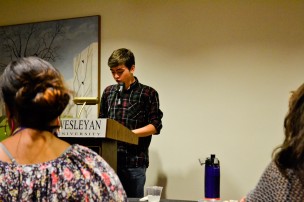
The University Queer Resource Center held a series of events for Pride Week, running from Sunday, Oct. 5 until Friday, Oct. 10. These ranged from a performance by a visiting theater company to a pizza party discussing heteronormativity in athletics.
Queer Community Intern Aidan Bardos ’17, who organized the week’s events, spoke to the importance of creating a queer community on campus.
“People come to Wes with different comfort zones, different backgrounds,” Bardos said. “Everyone is unique in their own way. Even if you’re a very confident senior at Wes, it’s important to remember that it’s important to have a presence on campus for students who have never had a community before and who need to feel that support.”
As part of Pride Week, David Jay ’04 spoke on Monday, Oct. 6 about his experience founding the largest asexual community in the world. Jay, who started the Asexual Visibility and Education Network (AVEN) in 2001, spoke about intimacy, relationships, and the problems facing the asexual community.
Jay began his talk by sharing his own story, stating that for a long time he assumed that there was something wrong with him due to his lack of sexual desire.
“Everyone around me was getting crushes; adults around me said that I was going to get crushes,” Jay said.
As a senior in high school, Jay started to use the term asexual. Throughout and after his time at the University, he defined different areas on the asexuality spectrum: Grey-A, Demisexual, and Aromantic.
Following his personal story, Jay discussed some of the major issues affecting the asexual community.
“[Asexuals are often viewed as] mechanistic, inhuman, and not capable of connection,” Jay said. Jay explained that there is a lack of understanding of aseuxals by the non-asexual community because sex is portrayed in mass media as being vital to human relationships.
Jay also spoke to the difficulty asexual people have in forming intimate romantic relationships.
“How do you do intimacy in a world that equates it with sexuality?” Jay asked.
Luke Davoren ’18, who attended the workshop, spoke about his desire to learn more about the asexual community.
“You don’t often see asexuals in the news or in the media, unlike the growth of LGBT characters on shows now,” Davoren said. “It was interesting in learning about a community that I knew so little about before the workshop.”
On Wednesday, Oct. 8, the Queer Resource Center held the annual pride week convocation, where several students and faculty members shared their stories of coming out. This year’s convocation featured Eric Hagen ’18, Lenny Liang ’18, and Jose Sanchez ’18.
Before the speeches, Bardos spoke about the individual nature of coming out.
“Coming out means something different to everyone,” Bardos said. “Some may choose to come out in the world; some may not. It’s important to recognize that what coming out really is… it’s coming out for myself. I’m proud and I’m ready, but it also depends on a lot of issues like class, race, culture, gender, ability, etc.”
Hagen expressed the differences he has felt as a member of the queer community at the University versus in his hometown.
“Of the 35 people in 200 Church, about 50 percent identify as queer, and honestly coming out at Wes didn’t feel like really coming out because students here are so accepting,” Hagen said.
Liang, on the other hand, spoke of a cultural struggle within the queer community.
“Part of me is still struggling between my own identity and the traditional Chinese morals that are planted inside of me, something that will never be eliminated,” Liang said. “Despite my personal opposition to the judgmental and inhumane society of my culture, to the society where no one actually talks about sexuality rightful[ly], I still love my motherland, my mother country….This is where I came from, this is whoI am, and what I’m going to be.”
Although each day of Pride Week featured an event with a distinct audience, Bardos stated that she wants to coordinate more community-building events and workshops in the future.
“Pride week is kind of hard because some people feel they don’t need to show any more pride than they do every day, but it’s also hard to include everyone in one week and really talk about intersectionality in one week,” Bardos said.
Bardos hopes to host a series of workshops and discussions on the intersectional nature of the queer community and queer oppression in spring 2015. She also expressed her desire to broaden the group involved in planning Pride Week events to incorporate as much of the queer community as possible.
Pride Week ends with National Coming Out Day on Friday, Oct. 10. The Queer Resource Center will celebrate by hosting a discussion at Open House at 9 p.m. about what coming out means to individuals on a personal level.


Leave a Reply